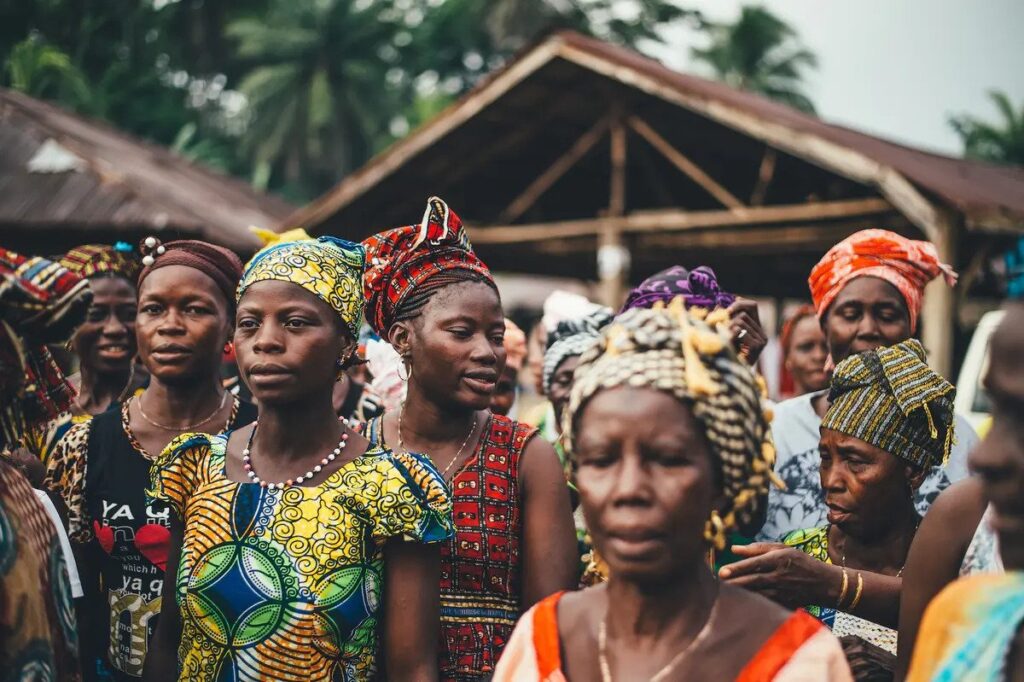In January 2023, President Julius Maado Bio of Sierra Leone signed the Gender Equality and Women’s Empowerment Act into law. This new law makes strides in establishing women’s rights in the west African country, though adequate implementation is necessary in order for it to have its intended impact.
In the aftermath of the country’s 10-year long civil war ending in 2002, women’s place in society deteriorated. Before the war, women held varying positions of power in the country and were active in politics. During the war, however, women were brushed to the side as second-rate citizens and maintained this same perceived ranking even after its end.
Many of the barriers and inequalities women face are due to the country’s laws. For instance, property rights used to only be able to be inherited by men, so women were not able to inherit property and widows could be kicked out of their own homes. Consent is also not required on the woman’s part for marriage, and many girls are forced into early marriages by their families, which not only inhibits their free will, but often prevents them from continuing their education: less than 2% of girls aged 15-19 are both in school and married.
In addition to young marriage, early pregnancies are common. In Sierra Leone, 3 in 10 girls under 18 are pregnant, whether by their husband or not. This, coupled with the 10-year ban from 2010-2020 that prohibited pregnant girls and teenage mothers from attending school, had a major impact on the number of girls completing their secondary education.
The ban ended because of COVID: during the Ebola outbreak in 2014, over 18,000 young girls fell pregnant, with the majority of them dropping out of school. The President wanted to avoid a repeat with COVID, and outlawed the ban. Even after the ban ended, though, stigma, discrimination and physical factors often prevent young pregnant women from continuing their education, despite how much they may want to.
Changing laws is the first step toward progress, but changing attitudes must be the second. Culture has comparable sway to the law when it comes to such issues. Improvements must be put into practice socially before any real change can be seen.
For example, there have been local acts in the past that aim to empower women in Sierra Leone, but there have been complaints of lack of follow through on the laws to affect visible change. For instance, there have been local policies that set an 18 year minimum age for marriage, require the consent of both parties and ensure women are able to remain on their property if their husbands die. In cases such as these, implementation and awareness are crucial in the next steps: just because women might be able to inherit land doesn’t mean they will.
Violence and non consensual marriage still persist and go unreported. Additionally, these laws still only exist on the local policy level, with bigger changes to the country’s national laws or constitution yet to be seen.
In terms of education, there have been successful programs for female education which show promise. The Transforming Girls’ Education program targets pre-teen and teenage girls specifically in an effort to keep them in school just when the enrollment gap between them and their male counterparts is widening. It has reached 80,000 girls so far and involves over 1,000 teachers.
For another recent project, the government set up community learning centers which operate with the purpose of reintegrating young mothers back to school to continue their education. They involved both program staff and local government to go home to home and bring young women back to school.
The effort was successful: in 2015, 14,500 girls were enrolled in the centers. The centers also worked with NGOs to address male mindsets and to educate communities on the importance of female education, an example of mindful follow-through to address root attitudes in society.
Increasing the number of women in schools is important, but it’s equally important to foster professional spaces for women to work after they graduate. As adults in Sierra Leone, women struggle to find significant roles in the country’s labor market and industry. While their presence percentage is fairly comparable, making up about half of Sierra Leone’s workforce, their participation is rarely equal. They have limited access to salaried positions and generally work for lower wages with weak job security.
Men are more likely to be salaried, which has the advantage of job security and a regular wage. They also tend to earn 30% more than women, and are more likely to hold managerial and professional positions. So, despite making up 50% of the workforce, women only occupy 27% of formal jobs. Typically women engage instead in informal labor like hairdressing, childcare and soap making, or they sell food and clothes, all of which pay very little.
The new Gender Equality and Women’s Empowerment Act aims to lay the groundwork to change that, implementing policies to help boost women’s positions professionally. For one, the act grants and ensures women the right to take out bank loans, which could make a large impact on the prevalence and success of women-led businesses, and women’s maternity leave also increased from 12 to 14 weeks.
Perhaps the most notable stipulation, though, is the requirement that both public and private entities must employ at least 30% women. This includes government positions, meaning at least 30% of parliamentarians must also be women. This is a huge step, as before just 13% of the Parliament and Cabinet and 19% of local governments were made up of women.
This act is making strides in the right direction for women’s rights in Sierra Leone. However, as previously stated, implementation is an extremely crucial and often overlooked step. Laws have been made in the past, but without anyone to enforce and see through the on the ground impact, often the new policies have less of an impact than intended.
This can be due to a variety of factors. One explanation is that some laws address the symptoms of a deeper-rooted issue. For instance, surface level causes of sexual violence might look like rape or forced prostitution, while more intrinsic issues of poverty and women’s role in society are less obvious and less targeted.
Another example of lack of follow through is in lifting the ban on pregnant women attending school, where just because the law no longer prohibits it, community mentality may. In the opposite vein, an example of successful implementation was the initiative to get young mothers back to school that involved community-based centers and local leaders. In terms of this new law, implementation and awareness include things like company and societal culture.
Until companies value and respect female employees and what they can contribute, women cannot truly be equal in the workplace. The government should create programs that integrate women into the workplaces that the law has just welcomed them into, creating a transition for the incoming women and pre-existing male workers. Continuing an emphasis on girls’ education is also essential. If companies hire underqualified women simply to fulfill the quota, it could cause negative sentiment and unfavorable results to the new law.
Such changes come with time, but it’s important for policymakers to keep their ear to the ground and foot to the pedal in encouraging them along. Part of this change comes with the increased presence of women in higher positions to inspire the next generation of young girls and show them what is possible.







